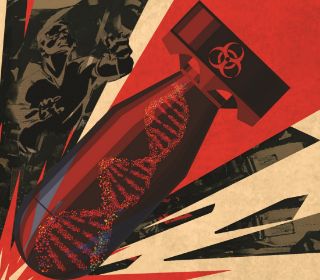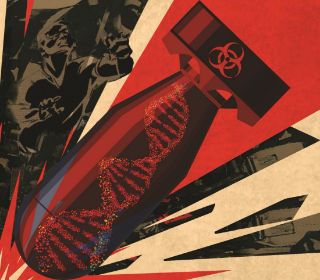Last June, German police arrested a man planning a terror attack by releasing large quantities of the biological toxin ricin, said to be 6,000 times more poisonous than cyanide. The raids on a block of flats in Cologne blew the lid off our worst fears: non-state actors laying their hands on bioweapons. [caption id=“attachment_6436781” align=“alignleft” width=“320”]  Illustration: Triparna[/caption] Technology has always changed war and its arsenal. Scientists, security experts and diplomats are increasingly talking about biological weapons when they discuss strategies to prevent proliferation of conventional and nuclear weapons. While biological attacks have been rare since the end of World War II, isolated incidents have been reported. The ‘anthrax letters’, which killed five people in the US following 9/11, is one such incident. The renewed attention to biological warfare also stems from advances in gene editing technologies. CRISPR-based technologies have allowed humans to edit genomes and manipulate organisms with precision at a low cost. The use of these technologies in humans, plants, animals and micro-organisms has spread rapidly. CRISPR has broken out of labs into garages and DIY kits. This ‘democratisation’ of science has triggered concerns about the misuse of technology to create pathogens that can be weaponised. A simple genetic tweak to a pathogen, for instance, can render it resistant to drugs or vaccines. A drug-resistant pathogen can rapidly spread disease in even a vaccinated population. In 2002, scientists used cutting-edge technology to recreate the polio virus from scratch by using data available in the public domain. The combined power of freely available knowledge and cheap tools have the intelligence community concerned. In 2016, the then-director of US National Intelligence, James Clapper, added gene editing to the list of threats posed by ‘weapons of mass destruction and proliferation’ in its annual worldwide threat assessment report. Two years later, experts at the Biological Weapons Convention discussed the potential for abuse of advances in gene editing. The convention is a multi-lateral treaty that prevents the development, stockpiling and use of biological agents. Even with 182 state-parties as signatories, the treaty has failed to guarantee the non-proliferation of biological weapons. Perhaps, it is because the convention does not have the authority to check if countries have destroyed their bioweapon stockpiles. Many countries, including the US, the UK, France and Japan, have had bioweapon programmes. Countries such as North Korea and China are reported to be covertly developing bioweapons. While a disarmament dialogue continues, there is a suspicion that many countries may be weaponising biological agents. Add to this mix new technologies such as gene editing, artificial intelligence and robotics and you have a fearful scenario: future bioweapons may no longer be natural in origin and could even be made at home. An artificially created Ebola epidemic or an airborne hepatitis strain could cause havoc within days. Not just humans, bioweapons can destroy agriculture, leading to starvation as well as crippling of a country’s economy. Newly discovered delivery systems such as gene drive, which alters DNA and set in motion genetic changes in a population, or the Insect Allies, a programme developed by the US’ Defense Advanced Research Projects Agency for delivering viruses to plants for peaceful purposes, can also be hijacked to transfer harmful agents across populations. Scientific tools and advances in biology have lowered the barriers for state and non-state actors to pursue biological weapons. A common ailment like flu can be easily contained in developed countries through robust vaccination and a responsive primary health care programme. But the same ailment can be disastrous for a country like ours. India has a weak primary health care system particularly in rural areas. It also has many densely populated areas where an infection can spread quickly. Hygiene—both personal and social—is poor with spitting and urinating in public almost a norm. Vaccination rates are low and India’s climate is conducive for infections. Considering this medley of factors, India remains vulnerable to disease outbreaks—natural or intentional—and should invest in biodefence capabilities. New-age technologies might threaten developed countries, but increased focus and discussions on bioterrorism may be enough for non-state actors to experiment with bioweapons anywhere in the world. India needs to take a lead position at the biological weapons convention and work with other countries to push for effective checks. For instance, the convention needs to have a scientific board to advice members on new threats and remedial measures. Given India’s vulnerability to disease outbreaks, investing in a strong primary health care system is paramount. The 2018 Nipah incident in Kerala exposed gaps in our health care response. Transparent protocols governing early responses to diseases—particularly to the unusual ones —have to be established. Point-of-care diagnostics and novel ways of disease detection need to be explored to quickly identify the pathogen and respond. Public awareness on hygiene and response to an outbreak would help prevent a serious incident. Non-proliferation of biological agents should be India’s primary focus, followed by early detection and, finally, containment. As these measures can also mitigate our high infectious disease burden, investing in them is urgent and completely justifiable. (Shambhavi Naik is a research fellow with Takshashila’s Technology and Policy programme)
India remains vulnerable to disease outbreaks—natural or intentional—and should invest in biodefence capabilities
Advertisement
End of Article


)

)
)
)
)
)
)
)
)



